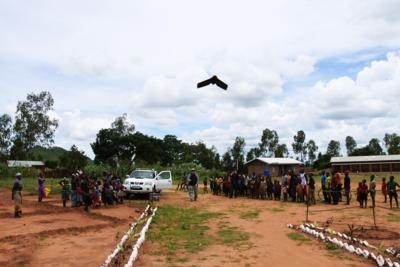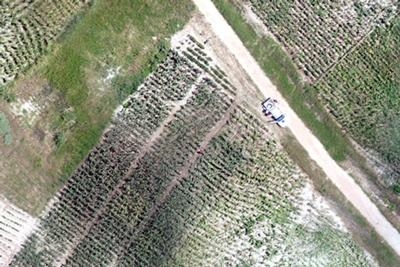Aircraft Being Used To Promote Sustainable Agriculture
Oakland University professor Jon Carroll, Ph.D., is part of a pioneering team of scholars harnessing the latest advances in science and technology to promote sustainable agriculture in Africa.

Carroll recently traveled to Liwonde, Malawi to work on a research project helping farmers boost crop production in the face of mounting threats posed by climate change. The project, called “Precision Agriculture for Smallholder Systems in Africa,” is part of Feed the Future, the U.S. government’s global hunger and food security initiative.
It is funded by the United States Agency for International Development (USAID), and is in collaboration with Michigan State University’s Center for Global Change and Earth Observations, and Kansas State University’s Sustainable Intensification Innovation Lab.
Carroll worked extensively with the Center for Global Change while in graduate school at Michigan State and was asked to join the project because of his expertise in using unmanned aerial vehicles for various research endeavors. These include archaeological excavations in Israel and a historical survey of Chateau de Balleroy, a 17th-century castle in Normandy, France. “They knew of the work I had been doing in different parts of the world, and they thought that drone capability would be a great asset to the project,” said Carroll, a Registered Professional Archaeologist, FAA-licensed drone pilot and assistant professor in OU’s Department of Sociology, Anthropology, Social Work and Criminal Justice.
So, how can a drone be used to counter the ill effects of climate change on crops in Africa and elsewhere? It starts with high-precision aerial photography that drones can provide to help researchers assess crop health.
As Carroll explained, “What we are doing is bringing highly detailed aerial imagery together with weather station data to understand what’s going on with these farm fields. This approach is widely available in the U.S., but in Africa they simply don’t have access to these technologies.”

The drone captures images with special cameras that allow researchers to quantify how much water and chlorophyll is in the plants. It also allows for 3-D measurements of plants in different parts of the field. Based on this data, researchers can recommend potential solutions to low crop yields. “The answer could be water or fertilizer, or it may be that they are growing the wrong types of crops for that soil,” Carroll said.
Researchers are also working to develop models that can better predict seasonal and environmental patterns, which have been disrupted by climate change.
According to USAID, recurring droughts have ravaged Malawi’s agriculture sector, threatening the livelihoods of Malawi’s smallholder farmers, who constitute 80 percent of the country's population. In addition, 38 percent of Malawians live below the poverty line and 47 percent of children have stunted growth. “It’s a big problem, potentially disastrous.” Carroll said. “We went down there in February because that’s their growing season, and it didn’t rain once while we were there.”
Carroll’s research team worked in conjunction with other research groups, which included government officials and scholars from Malawi and other places. Aside from the influx of visitors, the appearance of a flying object was a source of fascination for children and families in the community. “This is an area where people are just not used to seeing this type of technology, so any time that I flew the drone, we always had a crowd,” he recalled. “Entire families would come out to see what was going on, and I would make it a point to try to explain to the people what we were doing and answer their questions, either in English or through an interpreter.”
Carroll called his time in Malawi “one of the most profound” research experiences of his life. “I’ve worked in different parts of the world, usually on archaeological questions, and most of the people that I study have been gone for hundreds or thousands of years,” he explained. “This was a very different kind of project because I was surrounded by the people who were going to be affected by this research.”
Carroll lauded the College of Arts and Sciences and Department of Sociology, Anthropology, Social Work and Criminal Justice for their support of his work and for helping put Oakland at the forefront of drone-driven, global research efforts. “This is one capability we have that many other institutions in the region don’t,” he said. “Oakland is leading the way in using drone technology in different parts of the world, and for different purposes. None more urgent than helping those whose survival depends on achieving sustainable food production.”
(Images provided with Oakland University news release)
 ANN's Daily Aero-Term (12.14.25): Local Airport Advisory (LAA)
ANN's Daily Aero-Term (12.14.25): Local Airport Advisory (LAA) Airborne 12.08.25: Samaritans Purse Hijack, FAA Med Relief, China Rocket Fail
Airborne 12.08.25: Samaritans Purse Hijack, FAA Med Relief, China Rocket Fail ANN's Daily Aero-Linx (12.15.25)
ANN's Daily Aero-Linx (12.15.25) Airborne 12.10.25: New Gulfstream, ATC Integrator, Outrageous FFZ User Fees
Airborne 12.10.25: New Gulfstream, ATC Integrator, Outrageous FFZ User Fees Airborne-NextGen 12.09.25: Amazon Crash, China Rocket Accident, UAV Black Hawk
Airborne-NextGen 12.09.25: Amazon Crash, China Rocket Accident, UAV Black Hawk




